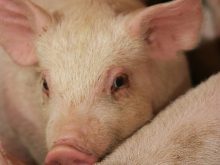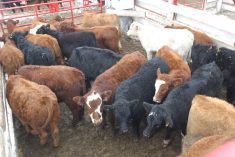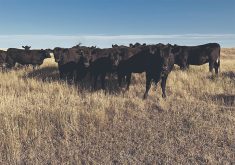The National Cattlemen’s Beef Association presses the government to ensure cell cultured protein is not called meat
NEW ORLEANS, La. — U.S. Agriculture Secretary Sonny Perdue has promised that meat substitutes will be regulated and labelled.
Cell cultured protein has received a lot of attention, and livestock groups such as the National Cattlemen’s Beef Association are pressing government to ensure it is not called meat. Clear labelling is demanded for plant based protein and meat products generated in a laboratory so that consumers know what they are buying.
“There are too many terms out there, and I am not sure consumers are fully aware,” said Danielle Beck of the NCBA.
Read Also

Beef check-off collection system aligns across the country
A single and aligned check-off collection system based on where producers live makes the system equal said Chad Ross, Saskatchewan Cattle Association chair.
“It is critically important that science is driving this debate. It is driving the regulatory framework governing these products.”
The Food and Drug Administration and U.S. Department of Agriculture will be responsible for regulating and inspecting proteins created in a laboratory or other substitutes, said Perdue.
“I want to assure you when it comes to harvesting that and calling it a product for people to eat, USDA is going to be there guarding the safety and the labelling of that product,” he said at the NCBA convention, held in New Orleans from Jan. 29-Feb. 1.
New rules could be required to describe and regulate these products.
A definition of meat already exists under USDA regulations.
In 2017, the American Meat Science Association said research is ongoing to produce animal-sourced food without harvesting animals by culturing muscle tissue from stem cells in a liquid medium. To be considered meat, these products must be comparable in composition and sensory characteristics to meat derived from animals. The amino acids and fatty acid profile as well as micronutrient content should meet or exceed conventional meat.
While plant-based products are becoming more mainstream, no lab cultured products are available. The first burger cost $300,000 to make, but the price has come down to about $11 per burger. The first commercial product on the market is likely to be chicken nuggets. Beef and pork cells are difficult to work with. No muscle cuts are expected anytime soon, so the first beef products will likely be meat balls or crumbles.
“Ultimately, the lab-grown industry envisions meat breweries for commercial production. They are talking about market entry as early as 2019, but last year they were talking market entry in 2018, so I think there is still a lot of time left and quite a bit of work to be done,” said Beck.
Meat processing giants Cargill and Tyson have invested in Memphis Meats of San Francisco, which is working on cell cultured meats.
Active campaigning to accept new products is coming from non-governmental organizations such as the Good Food Institute, a U.S. based organization that offers strategic support and lobbies on behalf of plant-based protein companies.
It is the driver behind the clean meat label.


















